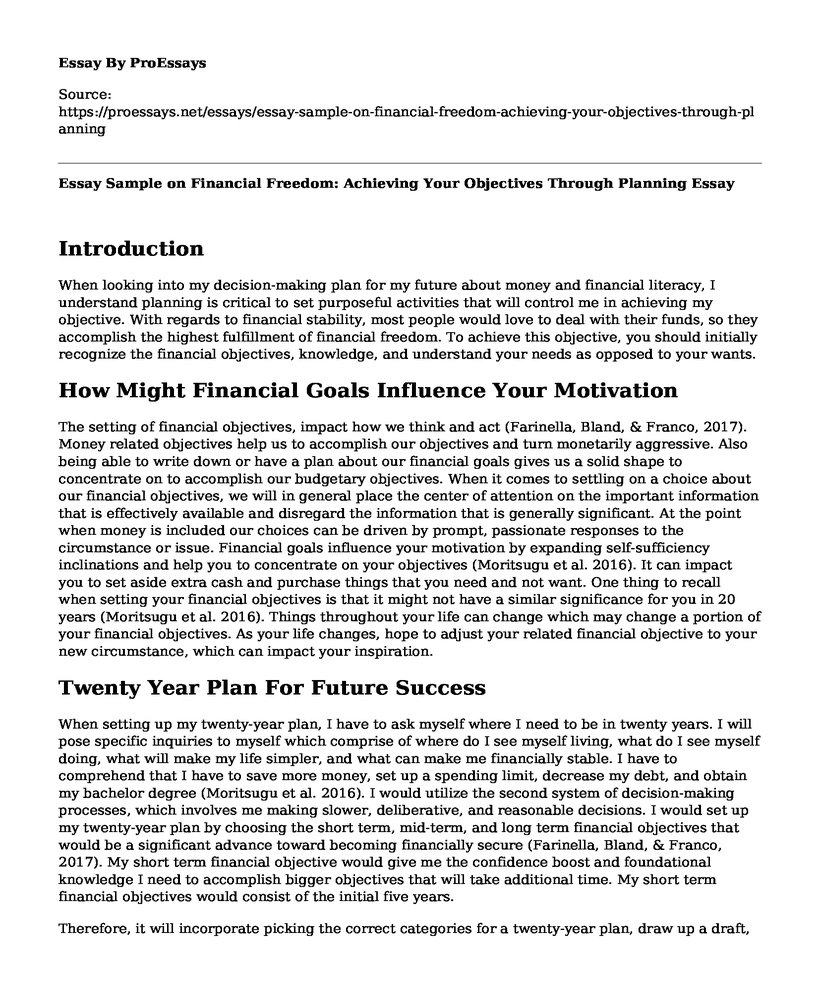Introduction
When looking into my decision-making plan for my future about money and financial literacy, I understand planning is critical to set purposeful activities that will control me in achieving my objective. With regards to financial stability, most people would love to deal with their funds, so they accomplish the highest fulfillment of financial freedom. To achieve this objective, you should initially recognize the financial objectives, knowledge, and understand your needs as opposed to your wants.
How Might Financial Goals Influence Your Motivation
The setting of financial objectives, impact how we think and act (Farinella, Bland, & Franco, 2017). Money related objectives help us to accomplish our objectives and turn monetarily aggressive. Also being able to write down or have a plan about our financial goals gives us a solid shape to concentrate on to accomplish our budgetary objectives. When it comes to settling on a choice about our financial objectives, we will in general place the center of attention on the important information that is effectively available and disregard the information that is generally significant. At the point when money is included our choices can be driven by prompt, passionate responses to the circumstance or issue. Financial goals influence your motivation by expanding self-sufficiency inclinations and help you to concentrate on your objectives (Moritsugu et al. 2016). It can impact you to set aside extra cash and purchase things that you need and not want. One thing to recall when setting your financial objectives is that it might not have a similar significance for you in 20 years (Moritsugu et al. 2016). Things throughout your life can change which may change a portion of your financial objectives. As your life changes, hope to adjust your related financial objective to your new circumstance, which can impact your inspiration.
Twenty Year Plan For Future Success
When setting up my twenty-year plan, I have to ask myself where I need to be in twenty years. I will pose specific inquiries to myself which comprise of where do I see myself living, what do I see myself doing, what will make my life simpler, and what can make me financially stable. I have to comprehend that I have to save more money, set up a spending limit, decrease my debt, and obtain my bachelor degree (Moritsugu et al. 2016). I would utilize the second system of decision-making processes, which involves me making slower, deliberative, and reasonable decisions. I would set up my twenty-year plan by choosing the short term, mid-term, and long term financial objectives that would be a significant advance toward becoming financially secure (Farinella, Bland, & Franco, 2017). My short term financial objective would give me the confidence boost and foundational knowledge I need to accomplish bigger objectives that will take additional time. My short term financial objectives would consist of the initial five years.
Therefore, it will incorporate picking the correct categories for a twenty-year plan, draw up a draft, and begin working my way through the list of what I need to get accomplished. I would have the arrangement to satisfy any obligation, set up a spending limit, create an emergency fund, work on raising my credit score and try to have an understanding of my expenses and costs. I would likewise take consideration of how my feelings and satisfaction can influence my future achievement. Yearly financial planning would similarly be conducted each year since it will be critical and would offer me a chance to formally review my objectives, update them, and review my progress for the past year (Farinella, Bland, & Franco, 2017).
My mid-term financial objectives which would comprise of year 6-10, will enable me to create a bridge between my short and long term financial objective (Moritsugu, Vera, Jacobs, & Kennedy, 2016). In my midterm objectives, I will consider buying my dream vacation home and having the finances to send my children through school. I would likewise set up an arrangement for my family by getting life insurance. I would figure up how much money it would take me to achieve these objectives and still carry on with the existence I need. I would keep on remaining on great terms with my financial assessment and remain on great terms with the bank. I would likewise begin separating my long term objectives into a series of detailed strides to make big assignments considerably more sensible. My long term financial objectives which would consist of year 11-20, would include funding an agreeable retirement, living obligation free, satisfying my home loan, venturing to the far corners of the planet, and getting my children through college obligation free.
References
Farinella, J., Bland, J., & Franco, J. (2017). The Impact of Financial Education on Financial Literacy and Spending Habits. International Journal of Business, Accounting, & Finance, 11(1), 1. Retrieved from http://search.ebscohost.com.libraryresources.columbiasouthern.edu/login.aspx?direct=true&db=edb&AN=123754481&site=eds-live&scope=site
Cite this page
Essay Sample on Financial Freedom: Achieving Your Objectives Through Planning. (2023, Jan 12). Retrieved from https://proessays.net/essays/essay-sample-on-financial-freedom-achieving-your-objectives-through-planning
If you are the original author of this essay and no longer wish to have it published on the ProEssays website, please click below to request its removal:
- Essay on the Rise of Medici Bank: Exploring 15th Century Financial Power
- Paper Example on PNC: Comprehensive Banking Services for Individuals & Corporations
- Essay Example on Australian Tax Law: A Complex System Explained
- Essay on Maximizing Value Investment in Healthcare: Aligning Economic and Health Incentives
- Raising Money from Friends and Family: Risks and Alternatives - Essay Sample
- Essay Example on Americans Paying More for Healthcare: Unsustainable Costs and Limited Knowledge
- Free Essay Example on Medical Claims Fraud: Billions Lost Annually







